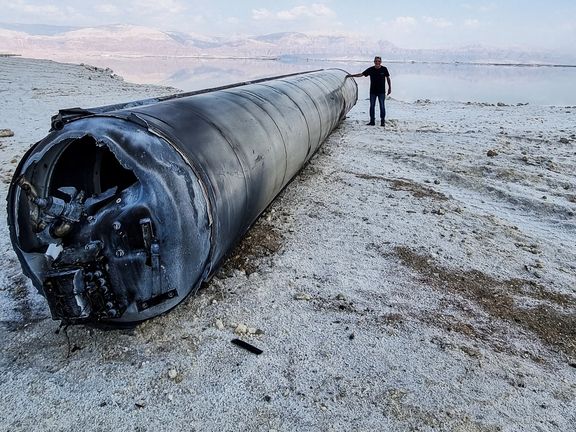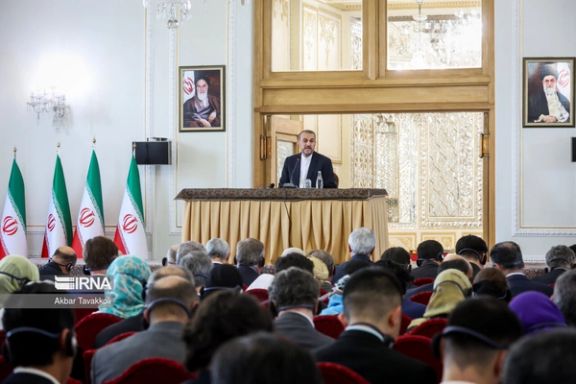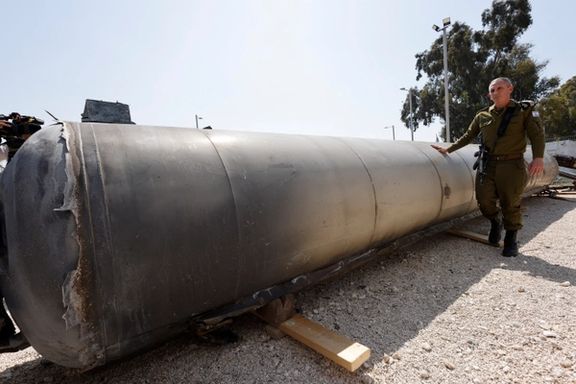Iran's Military Chief Hails Israel Attack 'Proud Operation'

The Iranian Chief of Staff of the Armed Forces, Major General Mohammad Bagheri, called the recent attack on Israel a "historical and proud operation."

The Iranian Chief of Staff of the Armed Forces, Major General Mohammad Bagheri, called the recent attack on Israel a "historical and proud operation."
He said that the aerial bombardment represents a new level of military capabilities and a new defense policy of Iran against the world, not acknowledging the fact that 99 percent of the 350 plus drones and missiles were intercepted by Israel and its allies.
An Israeli Defense Forces (IDF) spokesperson said all of the 170 drones and 30 cruise missiles were destroyed before reaching the borders of Israel, and most of the 120 ballistic missiles were intercepted with the help of Israel's long-range Arrow air defense system.
Meanwhile, the firebrand Tehran Friday Prayer Leader, Ahmad Khatami, said on Tuesday that: "After the IRGC attacked Israel, they scared the people, saying Israel will do this and that to them. But they couldn’t do anything. Even in the Security Council, they were unable to pass a resolution."
The United Nations Security Council held a special session in New York on Sunday over the attack but refrained from condemning Iran's activities.
US Ambassador Robert Wood called on the council to speak out against "aggressive actions" from Iran, while asking for an end to attacks by the Islamic Republic, its partners, and proxies. No resolution was offered, and the session ended without an agreed-upon formal statement or vote.
The bombardment was a retaliation for the April 1 alleged Israeli air strike on the Iranian consulate in Damascus which killed two senior Quds Force commanders and several IRGC personnel. Iran said the attack on Israel was a legitimate means of self defence following the Syria strike. Israel has not taken credit for the operation.

German Foreign Minister Annalena Baerbock has urged the European Union to consider an extension of sanctions to cover Iranian drone technology in the wake of the aerial assault against Israel over the weekend.
The EU has already imposed sanctions on Iran in its 27 member countries but Iran's drone exports to Russia remain ongoing for use in the war in Ukraine.
Baerbock emphasized the need to extend the existing "drone sanctions regime," which was established last year, to include more missile technologies used by Iran. "I hope that we can now finally take this step together," Baerbock stated.
"I campaigned in late autumn together with France and other partners within the European Union for this drone sanctions regime to be extended further," she said, adding she also wanted it to cover "other missile technologies in Iran's arsenal".
Baerbock is en-route to Israel to express Germany's solidarity after the attack in which over 350 drones and missiles were launched towards Israel, making her the first high-ranking official to do so.
She said the trip aims to "assure our Israeli partners of Germany's full solidarity" and to discuss "how a further escalation with more violence can be prevented."
The barrage launched Saturday night was the first direct attack from Iranian soil to the Jewish state and followed an alleged Israeli air strike earlier this month in which two top Quds Force commanders were killed along with several IRGC personnel. Most of the bombardment was intercepted en-route by Israel and its allies.
Earlier on Tuesday, Israel’s Foreign Minister, Israel Katz, called on 32 countries to sanction the Islamic Revolutionary Guard Corps (IRGC) and its missile program, urging for the designation of the IRGC as a terrorist organization. EU members claim legal complexities are involved in such a designation as it is a state body.
The IRGC, established in 1979, has significant military, political, and economic influence in Iran and has been implicated in international activities, including plots in the UK. In response, the UK has imposed sanctions on IRGC's Unit 840, which is associated with assassination attempts against British nationals. Bahrain, Saudi Arabia, Sweden, and the United States have already designated the IRGC as a terrorist organization.
Later on Tuesday, EU foreign policy chief Josep Borrell said that some EU member states have asked for sanctions against Iran to be expanded in response to Tehran's attack on Israel and the bloc's diplomatic service will begin working on the proposal.
Borrell was speaking after an emergency video conference of EU foreign ministers called to discuss the repercussions of the attack.

Wreckage from Iranian missiles and drones destined for Israel has been discovered across Iraq following Saturday night’s foiled bombardment.
Over the weekend, US-led coalition forces in Iraq successfully intercepted dozens of the projectiles, a source close to the Iraqi government told The National.
The majority of the Iranian drones and missiles were shot down above key areas including Baghdad, Najaf, and the semi-autonomous Kurdish region in northern Iraq.
US anti-missile systems stationed at the Ain Al Asad airbase in Anbar province were pivotal in neutralizing the airborne threats. Additionally, a US Patriot battery in the Kurdish region intercepted at least one ballistic missile, which subsequently crashed in the Soran district near Erbil.
Following the attack, which involved more than 300 drones and missiles launched by Iran towards Israeli territory, the Iraqi landscape was littered with remnants of the intercepted weapons. Notably, parts of a drone were found in an open area outside Najaf. No casualties have been reported from the incident, another official said.
Along with the US, Israel was aided by the UK, Jordan and France in the mission to intercept the barrage.
The Iranian offensive came in retaliation to an Israeli airstrike on April 1 on Tehran's consulate building in Damascus, which resulted in the death of two high-ranking Iranian military officials plus other IRGC personnel.
Despite the chaotic aftermath, the Iraqi government has yet to issue a formal denunciation of Iran’s use of its airspace for the attacks.
A spokesman for the Iran-backed Al Nujaba militia in Iraq criticised Baghdad after the attack, saying the intervention of US forces "undoubtedly embarrasses the Iraqi government, which seeks to take a clear position on the American military presence" in the country.
The US Central Command said it “successfully engaged and destroyed” more than 80 one-way attack drones and at least six ballistic missiles intended to strike Israel from Iran and Yemen. It was the first direct attack from Iranian soil to target the Jewish state after years of shadow warfare.

A Republican Senator is pressing the Secretary of State to "immediately revoke" the visa issued to Iran's Foreign Minister ahead of his trip to a UN meeting in New York this Thursday.
“After Iran attacked an ally of the US it would be absurd for the State Department to allow Iranian Foreign Minister a visa to travel in the US,” Senator James Lankford's wrote on X.
Iran's UN mission confirmed that Hossein Amir-Abdollahian will represent Iran at a UN Security Council meeting on Israel's Gaza war this week.
Amir-Abdollahian has visited the US twice since attacks carried out by terrorist group Hamas – part of Tehran's proxy network – on Israel.
“Given his ties to terrorism against Israel and US forces, Amir-Abdollahian should not be welcome in our country,” read Republican Senator James Lankford's letter addressed to US Secretary Antony Blinken.
Following Iran's unprecedented attack on Israel this past Sunday, the Iranian government official’s visit comes at a time of unparalleled tensions between Tehran and Tel Aviv.
Iran’s armed forces launched over 300 drones and missiles in response to purported Israeli attacks in Syria which killed several Islamic Revolutionary Guard Corps officials.
The visit also coincides with the 41st anniversary of the 1983 bombing of the US Embassy in Beirut, carried out by the Islamist terrorist group Hezbollah, with support from Iran. That attack killed 63 people.
Last month, a group of 27 House Representatives penned a letter to the State Department, urging the Biden administration to ban Iranian officials from attending UN meetings in the US.
The US is generally required to allow foreign diplomats access to the United Nations under the 1947 "headquarters agreement" – though Washington can refuse visas for reasons related to security, terrorism, and foreign policy.
In 2020, after then-President Donald Trump ordered the killing of prominent military commander, Qassem Soleimani, Iranian Foreign Minister Mohammad Javad Zarif was denied a visa to attend a UN Security Council meeting in New York.
The Biden administration has been under pressure for not taking a firmer stance against Iran’s aggression from lawmakers and US allies – all against the backdrop of the upcoming presidential election.
“Hamas, Hezbollah, Palestinian Islamic Jihad and the Houthis are all currently attacking our ally Israel with weapons supplied by Iran. The Biden Admin can and should stop the Iranian foreign minister’s entry into the US,” Senator Lankford wrote on X.

Iranian government and military officials are doubling-down on their narrative that Sunday’s attack on Israel was a great success.
The Islamic Revolutionary Guards (IRGC) launched 170 drones, more than 30 cruise missiles and more than 120 ballistic missiles – 99% of which were intercepted by Israel and its allies.
In the days since the unprecedented attack, several politicians have spoken out in support of the military action against Tel Aviv.
That included Esmail Kosari, a parliamentarian who sits on the National Security Committee, who justified the operation and framed it as a "legitimate defense against Israel”.
“The news, information, and documentation of the amount of damage we caused to Israel will be made known to the people so that the people of Iran will be informed about the details of the relevant information," Kosari said.
Israel has reported that damages sustained by the attack were limited to minor damage of its air base in Nevatim.
Reports also suggest that a 7-year-old girl from a Bedouin community in Israel suffered a head injury, potentially due to shrapnel from an intercepted ballistic missile falling directly on her home.
Support for Tehran’s military operation also came from so-called reformist journalists, one of whom warned against “internal dissent” and echoed the IRGC’s narrative of the event, criticizing those who dispute the effectiveness of the operation.
“Unfortunately, some inside the country have become defenders of the devil…they promote and reproduce 99 percent of the Israeli narrative,” Mashallah Shamsolvaezin said.
Threats Of Harsher Retaliation
The rhetoric from Iranian officials also included warnings directed at Israel and the United States.
The government’s parliamentary speaker, Mohammad Bagher Ghalibaf, warned Israel of "harsher responses".
Meanwhile, the Army’s Commander-in-Chief Abdolrahim Mousavi, threatened heavier retaliation “if Israel persists in its actions”.
Mousavi also threatened Washington to steer clear from using its bases in any retaliation, saying that "they will be considered operational targets and will be targeted".
The Supreme Leader Ali Khamenei's representative in the northwestern province of Khorasan, reinforced these warnings by invoking the possibility of devastating retaliatory measures.
Other Iranian figures such as Sadegh Amoli Larijani, Chairman of the Islamic Republic’s Expediency Council, and Iraj Masjidi, a senior adviser to the commander of the IRGC, insisted on the “failure of Israeli defenses” to deter Iranian missiles, boasting Iran's confidence in its military capabilities.
Parliamentarian Jalil Rahimi Jahanabadi, another member of the National Security Committee, further claimed that "in order to achieve peace, one must stand against the tyrant and the aggressor."
Mahmoud Abbaszadeh Meshkini, another parliamentarian, dismissed Israel's capabilities in fighting against the Islamic Republic saying that Israel is not capable of doing anything against Iran’s national interests.
“They just pretended to fight back," he said.
"I think it is unlikely that Israel will hit our civilian sites, not even our military sites," said parliamentarian Abbas Golrou.
Golrou also expressed skepticism about an all-out war with Israel – suggesting that neither Iran nor the US desire that kind of conflict.

US Treasury Secretary Janet Yellen on Tuesday said Iran's attack on Israel last weekend and its financing of militant groups threatened stability in the Middle East and could cause economic spillovers.
Yellen began remarks prepared for a news conference by addressing what she called an unprecedented attack on Israel by Iran and its proxies, saying Treasury would use its sanctions authority and work with allies to "continue disrupting the Iranian regime’s malign and destabilizing activity."
The United States is using financial sanctions to isolate Iran and disrupt its ability to fund proxy groups and support Russia's war in Ukraine, the Treasury Department said. However, critics says the administration is not enforcing some key sanctions, providing Iran with a partial reprieve.
Treasury has targeted more than 500 individuals and entities connected to terrorism and terrorist financing by the Iranian regime and its proxies since the start of the Biden administration in January 2021, Yellen said.
That has included targeting Iran’s drone and missile programs and its financing of the Palestinian militant group Hamas, the Houthis in Yemen, Hezbollah in Lebanon, and Iraqi militia groups, she said.
"From this weekend’s attack to the Houthi attacks in the Red Sea, Iran’s actions threaten the region’s stability and could cause economic spillovers," Yellen said, without giving details.
She spoke at a news conference during this week's meetings of the International Monetary Fund and World Bank, which bring top finance officials to Washington from around the world.
The Biden administration continues the policy of the Trump administration in sanctioning companies and individuals involved in Iran’s destabilizing activities and weapons programs. However, since President Biden took office in early 2021, enforcement of Trump’s oil export sanctions on Iran have become weak, as the administration has sought to revive the JCPOA nuclear accord. Moreover, Biden has offered sanctions waivers to Iran totaling at least $16 billion in 2023.
When asked about Iran's continuing oil exports despite US sanctions, Yellen replied, "We have been working to diminish Iran's ability to export oil...There may be more that we can do."
Iran on Saturday launched more than 300 drones and missiles against Israel, its first direct attack on the country, in retaliation for a suspected Israeli air strike on its embassy compound in Damascus on April 1 killed elite military officers.
Israel's military said that it shot down almost all the drones and missiles, and that the attack caused no deaths, but the situation has increased fears of open warfare between the longtime foes.
In Gaza, thousands of Palestinians have been killed in the Israeli offensive launched against Hamas after the group attacked Israel on Oct. 7, killing 1,200 people and taking 253 hostages, according to Israeli tallies.
Yellen said Washington was continuing to use economic tools to pressure Hamas, but said Treasury was emphasizing that its sanctions should not impede life-saving aid.
She called for urgent action to end Palestinian suffering in the narrow enclave, noting that Gaza's entire population of more than 2 million people was facing acute food insecurity and that most of the population had been displaced.
"It is incumbent on all of us here at these meetings to do everything in our power to end this suffering," she said.
Yellen noted that Washington was also using sanctions to target extreme settler violence in the West Bank, while working to ensure a functioning banking system there and supporting IMF programs in Jordan and Egypt.
With reporting by Reuters






